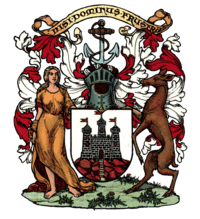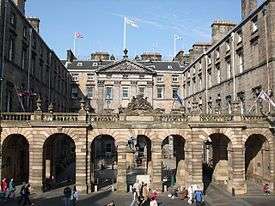The City of Edinburgh Council
| The City of Edinburgh Council | |
|---|---|
| Full council election every 4 years. | |
 Coat of arms | |
|
The City of Edinburgh Council logo | |
| Type | |
| Type | |
| History | |
| Preceded by | City of Edinburgh District Council |
| Leadership | |
Council leader | |
Depute Leader | |
| Structure | |
| Seats | 63 |
 | |
Political groups |
|
| Elections | |
| Single transferable vote | |
Last election | 5 May 2017 |
Next election | 5 May 2022[3] |
| Motto | |
| Nisi Dominus Frustra | |
| Meeting place | |
 | |
| Edinburgh City Chambers | |
| Website | |
|
www | |
The City of Edinburgh Council is the local government authority for the City of Edinburgh. It was created in 1996 under the Local Government etc. (Scotland) Act 1994, with the boundaries of the post-1975 City of Edinburgh district of the Lothian region.
History
Prior to the Local Government (Scotland) Act 1973 Edinburgh was administered by the single tier "Edinburgh Corporation", which covered the "City and Royal Burgh of Edinburgh". As such, the Edinburgh Corporation was responsible for local government services, such as the Edinburgh Corporation Transport Department (Edinburgh Corporation Tramways until 1928). The Edinburgh Corporation had the power to make Burgess (freemen) of the City of Edinburgh and to grant "Seals of Cause" to guilds and trade organisations. The Edinburgh Corporation awarded Burgess Ticket through the Lord Dean of Guild, an office in the Corporation. Like the Corporation of the City of London, Burgess Tickets were often awarded along with a 'Freedom Casket' – a container to hold the ticket. Bodies such as the Merchant Company of Edinburgh, the Incorporated Trades of Edinburgh and The High Constables of Edinburgh formed part of the corporation, contributing councillors and law enforcement officers. The Edinburgh Corporation had the power to institute these organisations via the granting of a "Seal of Cause". This empowered the societies as "a legal corporation with power to hold property, make its own by-laws and regulations". Other organisations to receive the "Seal of Cause" include The Royal Burgess Golfing Society of Edinburgh, who received their seal on the 2nd July 1800.[4] The history of the corporation lives on elsewhere around the city, for example in the name of the members of Muirfield golf club, who were granted a charter by the corporation in 1800 becoming "The Honourable Company of Edinburgh Golfers". Many of Edinburgh's ceremonies and traditions date back to the days of the Edinburgh Corporation, such as the Edinburgh Ceremony of the Keys, where the Lord Provost symbolically hands the keys to the City of Edinburgh to the monarch, who hands them back to the Lord Provost proclaiming "that they cannot be placed in better hands than those of the Lord Provost and Councillors of my good City of Edinburgh".
In 1975, Edinburgh Corporation was abolished. The new two-tier system consisted of Lothian Regional Council (with responsibility for water, education, social work and transport) and the City of Edinburgh District Council (with responsibility for cleansing and libraries). The City of Edinburgh became a single-tier council area in 1996, under the Local Government etc. (Scotland) Act 1994, with the boundaries of the City of Edinburgh district of the Lothian region. The district had been created in 1975, under the Local Government (Scotland) Act 1973, to include the former county of city of Edinburgh; the former burgh of Queensferry, the district of Kirkliston and part of Winchburgh formerly within the county of West Lothian; and the district of Currie and the parish of Cramond formerly within the county of Midlothian.
Powers and functions
The City of Edinburgh Council governs on matters of local administration such as:
- Housing
- Planning
- Local transport
- Parks
- Local economic development
- Urban renewal regeneration
The Council is also responsible for:
- Appointing Committees of the Council
- Appointing of the Chief Executive, Chief Officers, members of Committees, joint boards and outside bodies
- Setting council rules, bye-laws, regulations and standing orders
- Setting the council tax, annual council budget and administering the city's capital investment programme
The full Council meets once a month on a Thursday, except during recess and holiday periods, and is chaired by the Lord Provost of Edinburgh.
Policy Development and Review Sub-Committees
Each Executive Committee has a Policy Development and Review Sub-Committee. These sub-committees develop policy aided by witnesses who are invited to give evidence or provide their view on a particular policy. This approach aims to increase the public’s engagement with the democratic process and result in improved, more inclusive policies.
Governance, Risk and Best Value Committee
The Governance, Risk and Best Value Committee considers and scrutinises the financial and service performance of the Council, its companies and major projects. It also performs the audit function of the Council. The Convener of the Committee is an opposition Councillor.
Petitions Committee
The Petitions Committee allows a new method for individuals, community groups and organisations can get involved in what the Council does. It allows people to raise issues of public concern and gives Councillors the opportunity to consider the need for change. The Convener of the Committee is an opposition Councillor.
Planning and Regulatory Committees
The Planning Committee is principally concerned with issues of planning and development, including the granting of planning permission and street naming. The Regulatory Committee deals with issues such as health and safety and buildings in need of repair as well as determining individual applications for registration and licensing of food premises, bars, restaurants and entertainment venues under the Civic Government (Scotland) Act 1982 and other statutory powers. Membership of such committees reflects the party balance on the council.
Neighbourhood partnerships
In June 2007 the six local development committees in Edinburgh, one for each Scottish Parliamentary Constituency were replaced by neighbourhood partnerships.[2] Typically these combine the councillors from two council wards with representatives of community councils. Neighbourhood partnerships are tasked with dealing with issues that are specific to their local area and influencing the delivery of key council services including street cleaning, urban parks, libraries, local development, road maintenance, traffic and parking issues. Local committees meet several times each year.
External Committees
The Council also appoints elected members to serve on:
- The Licensing Board
- Lothian Valuation Joint Board
Elections
The last election to the council was held on Thursday, 4 May 2017.
Members of the council represent 17 electoral areas called wards. As a result of the Local Governance (Scotland) Act 2004, multi-member wards were introduced for the 2007 election, each electing three or four councillors by the single transferable vote system, to produce a form of proportional representation. Previously each of 58 wards elected one councillor by the first past the post system of election.
Wards
| Ward number | Ward name | Seats |
|---|---|---|
| 1 | Almond | 4 |
| 2 | Pentland Hills | 4 |
| 3 | Drum Brae/Gyle | 3 |
| 4 | Forth | 4 |
| 5 | Inverleith | 4 |
| 6 | Corstorphine/Murrayfield | 3 |
| 7 | Sighthill/Gorgie | 4 |
| 8 | Colinton/Fairmilehead | 3 |
| 9 | Fountainbridge/Craiglockhart | 3 |
| 10 | Morningside | 4 |
| 11 | City Centre | 4 |
| 12 | Leith Walk | 4 |
| 13 | Leith | 3 |
| 14 | Craigentinny/Duddingston | 4 |
| 15 | Southside/Newington | 4 |
| 16 | Liberton/Gilmerton | 4 |
| 17 | Portobello/Craigmillar | 4 |
Electoral History
| Election | Control | Administration | |
|---|---|---|---|
| 1972 | No overall control | Progressive-Conservative minority | |
| 1973 | No overall control | Conservative-Progressive minority | |
| 1974 | No overall control | Labour minority | |
| 1977 | Conservative | Conservative | |
| 1980 | No overall control | Conservative minority (Liberal support) | |
| 1984 | Labour | Labour | |
| 1988 | Labour | Labour | |
| 1992 | No overall control | Labour | |
| 1995 | Labour | Labour | |
| 1999 | Labour | Labour | |
| 2003 | Labour | Labour | |
| 2007 | No overall control | Lib Dem – SNP | |
| 2012 | No overall control | Labour – SNP | |
| 2017 | No overall control | SNP – Labour | |
See also
References
- ↑ http://www.edinburgh.gov.uk/news/article/2306/leaders_sign_coalition_agreement_to_run_the_capital
- ↑ https://www.theedinburghreporter.co.uk/2017/05/interview-with-the-new-lord-provost-at-city-chambers/
- ↑ http://www.edinburgh.gov.uk/info/20033/elections_and_voting/258/upcoming_elections/
- ↑ http://www.scottishgolfhistory.org/oldest-golf-clubs-societies/1735-royal-burgess-golf-society/